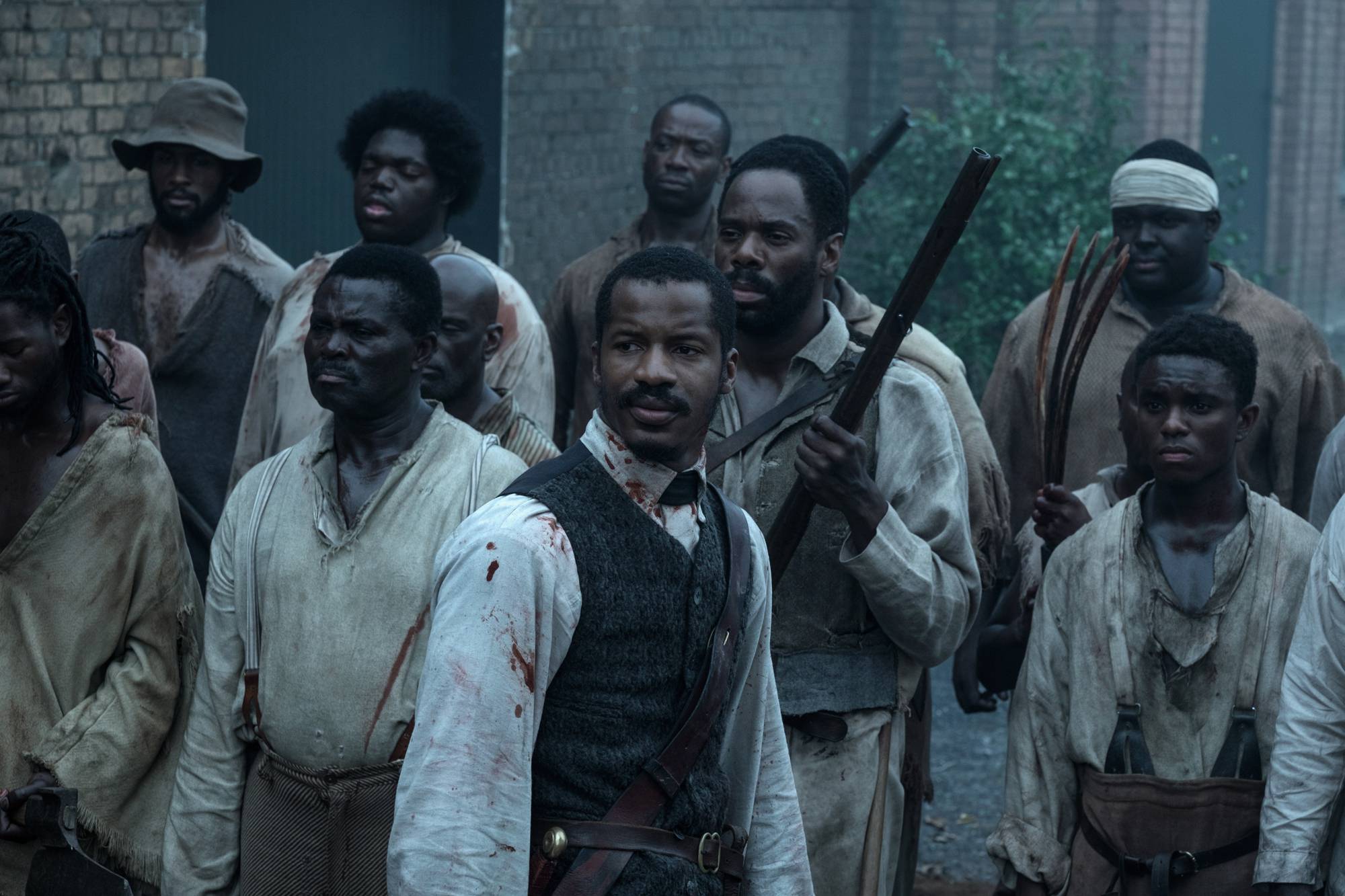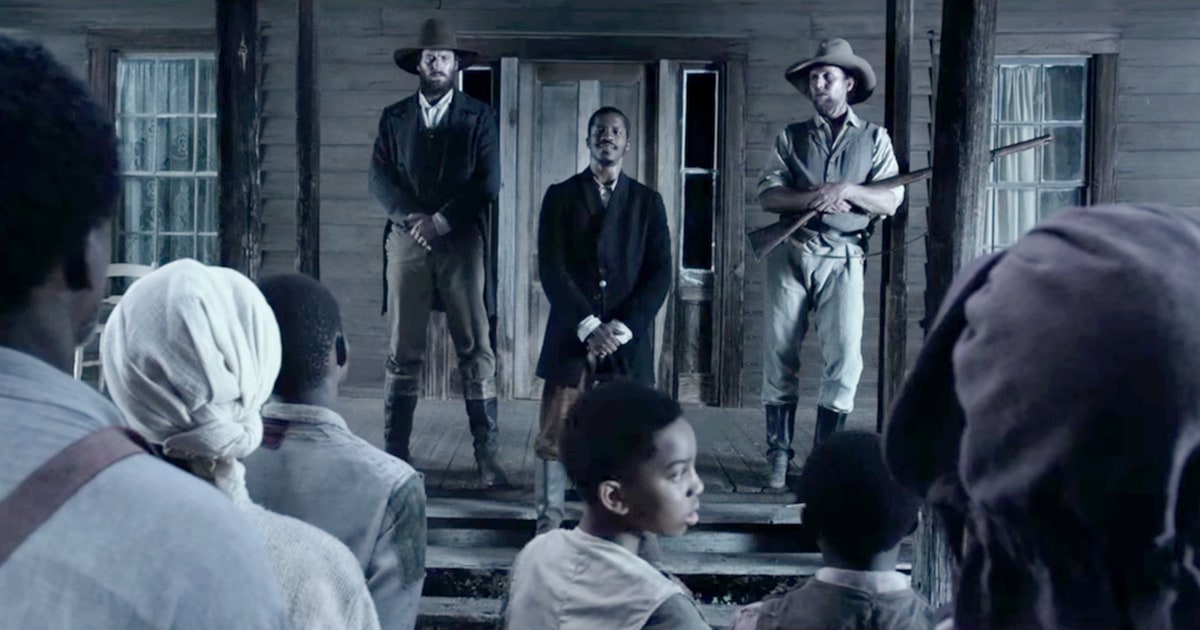Nate Parker creates a seminal work depicting the life of Nat Turner in The Birth of a Nation, but in doing so, he also compromises to the point of betrayal.
Nat Turner was not a man of sound mind, at least the real Turner, not the version depicted in Nate Parker’s debut film, The Birth of a Nation.
As the real Turner awaited his fate at the end of a hangman’s rope in a Virginia jail, Turner was resolute as he shared the details of his insurrection to attorney Thomas Ruffin Gray, who later collected the confession, selling it in book form.
During that confession, Turner told Gray of his motivations, almost all of which found its basis and justification in religious fanaticism. For Turner, his task was a righteous one, and no one, including women or children were to be spared.
As described to Gray, Turner detailed his path of violence, stating that at one home, there was “a little infant sleeping in a cradle, that was forgotten, until we . . . returned and killed it.” When they reached another home, Turner described how his men stabbed a woman as she slept, and when her son woke up from the noise, “it was only to sleep the sleep of death.”
These are strong and brutal depictions which only matched the level of brutality that slaves faced during that period, something Parker never shies away from, much like practically every other film about slavery.
When originally announced that Parker, an actor in smaller films (Denzel Washington’s The Great Debaters), was raising money to depict the rebellion of Nat Turner, it went by without much in the way of notice. However, by the time the finished film premiered at Sundance in January 2016, it did so to massive adulation. For festival goers, The Birth of a Nation became an important film everyone must see, bringing with it both accolades, and later aspersions as Parker’s past inevitably came to the fore.
But all that aside, now seeing the film (twice), the only important question that remains is whether or not The Birth of a Nation is a good film.
This is where the struggle truly begins for this reviewer.
Without question, The Birth of a Nation is an important film by its very existence alone. In the myriad of films depicting the plight of African-Americans during slavery, very few ever dealt with stories of revolt, and as one of the more well-known stories, Nat Turner’s tale went largely untold.
Finally seeing Turner’s story unfold on screen, it feels like a necessary piece of American history is being presented for all, however the reality is that the film falls into the same traps that many films about slavery fall into, and in the exchange, Turner’s story is essentially betrayed.
Over the years, we’ve been inundated with cliche after cliche, and among those is the adage that states “war is hell”. The very concept of that cliche is to illustrate how indiscriminate war can be, how people, both good and bad, likable or not, can fall victim at any time, and the loss itself is not unlike hell.
Slavery, without question was hell. It was a living hell unlike any other in the American experience, and as such, is marked with depictions of great suffering. In that, The Birth of a Nation is no different, but what seems to be lost here is the idea that Nat Turner’s story was never meant to be one of slavery, but rather one of revolt, and it’s the revolt in this film that gets such as short shrift.
The majority of this film is Parker’s attempt to humanize Turner not only through his direction, but also through his performance. Unlike the historical depiction of Turner as a clear fanatic whose turn to violence was one of religious conviction, Parker portrays Turner as an affable man who was pushed to the edge, as if the institution of slavery, with all its trappings (pun intended) wasn’t enough.
This is certainly an infuriating aspect of The Birth of a Nation, but unfortunately, it’s not the only one, nor is it the worst.
Unlike films such as Mel Gibson’s Braveheart, Parker is almost apologetic in his depiction of oppressors. On one side, you have the Turner family, whose matriarch (Penelope Ann Miller) takes a shine to young Turner, noticing his ability to read (something that was largely forbidden among slaves, for obvious reasons), and deciding to teach him further, but only the bible, because that’s all she believed a black mind could handle.
Armie Hammer portrays Samuel Turner as a complicated, yet somewhat kind man who grew up with his property, explaining why he wasn’t outwardly cruel to him. This is relatively true to Nat’s actual history, as the Turner family did indeed educate Nat, but they would also later sell him, something not depicted in the film.
On the other side, you have your stock brutal racists, encapsulated in the performance of Jackie Earle Haley as Raymond Cobb, a bounty hunter for slaves, who does exactly what you expect him to do as he serves as one of the catalysts for Turner’s revenge as he and his band of hunters rape and beat his wife (Aja Naomi King).
In fact, the film telegraphs what’s to come in an almost paint-by-numbers fashion, as the indignities Turner either witnesses or endures later becomes the on-screen list of victims.
And it is here where we come to the most infuriating part of The Birth of a Nation.
Once Turner, after being beaten within an inch of his life for baptizing a white man (something that never actually happened, at least not as depicted here), decides to revolt, we’ve already been through 90 minutes of a love story and a standard slavery tale, but only the last 20 minutes of the film are devoted to the actual revolt itself (you know, the reason why the film exists, or at least should exist).
On film, slaves are better framed as victims than as aggressors. That is all that mainstream audiences seem to be able to handle, and for Nate Parker to give into that in order to get The Birth of a Nation made is truly a gray area.
Twenty minutes. That’s it. While the actual revolt unfolded over the course of 48 hours with a death toll of 60 men, women and children, all of this only merited a portion of the third act of the film.
In fact, while viewers are treated to seeing black men and women brutalized by being force fed after having teeth knocked out with a chisel, beaten and raped, set on fire and hung, there are a total of four onscreen deaths of white men, and of those, they contain only those who fit the “villain” role.
When Nat wakes his master out of his sleep to kill him, the first thing he does afterward is to go outside to vomit, as if somehow years of violence visited upon him and others did not match up to the gravity of killing a white man, and yes, this is a betrayal, because it’s in this moment where it’s painfully clear how The Birth of a Nation ever made light of day.
While this should have been a film clearly focused on the horrors of the revolt, we get an obscenely apologetic revenge film, and although it may seem a bit much to criticize a film because we don’t see enough white people, including women and children, being murdered on screen, this is essentially the dark, brutal history lesson that we deserve, but will never get, because in this system, it’s far easier to show dead black men, women and children than it is to see dead whites, particularly when at the hands of black men.
It’s both laughable and sad that films still have to treat slavery as being wrong because of cruelty. Nat Turner didn’t revolt because of cruelty alone, he did so because through his fanaticism, he was convinced that a man owning another man, period, should be punishable by death.
And yet we still see the issue of slavery on film depicted as only being as wrong as the brutality is extensive.
This is what we have become accustomed to, and this is what audiences at Sundance adored.
On film, slaves are better framed as victims than as aggressors. That is all that mainstream audiences seem to be able to handle, and for Nate Parker to give into that in order to get The Birth of a Nation made is truly a gray area, because this is a film that should be seen for historical purposes, so that future generations can see that once upon a time, slaves did more than just suffer in silence or in song.
But as necessary as this film is, it still feels like a damned betrayal. Not just of African-Americans, but of all Americans, because everyone deserves to know their past, for good or ill.
Hashim R. Hathaway (Uncle Shimbo) is the host of the Never Daunted Radio Network, and proud father to NeverDaunted.Net. You can reach him on Twitter @NeverDauntedNet


